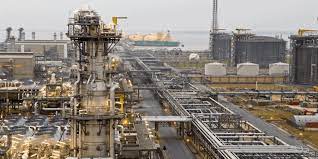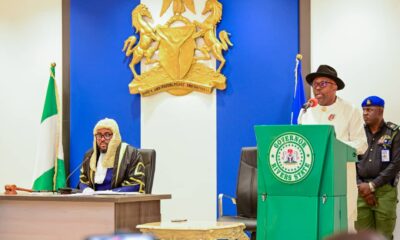Oil & Energy
Content Policy Saves $2bn In NLNG Train 7

Nigeria was saved the sum of $2 billion dollars from the ongoing Train 7 of the Nigeria liquefied Natural Gas (NLNG) project as a result of using Nigerian firms, says the Executive Secretary, Nigerian Content Development and Monitoring Board (NCDMB), Mr Simbi Wabote
Wabote, stated this last Friday, shortly after receiving the award of African Local Content Icon, from the African Leadership magazine, in Yenagoa.
The NCDMB Executive Secretary, who dismissed the assertion that the Nigerian content policy was costly, and a ploy by foreign interests who do not wish the country to develop, described the claim as blackmail, because experience had shown that the policy was more cost effective for oil firms.
“The Nigerian content policy saves costs, from the projects that the NCDMB have supervised it is clear that it is better for the International Operating Companies in Nigeria, but foreign interests at global levels erroneously say that local content is expensive.
“Before the move to increase the participation of Nigerians in the oil and gas sector, the participation was at about three per cent and previous administrations relied mostly on taxes and revenue and lost sight of the opportunities for Nigerians to get involved in the sector.
“From the oil sector where I am coming from, it is five times more expensive to pay an expatriate than a Nigerian, so how can they say that local content is more expensive ?
“ On the Train 7 project if you look at the cost provided by foreign companies, you have a wide gap of about $ 2 billion from the quotations of the lowest submitted by foreign firms and the highest from Nigerian companies, so local content is better as we ensured that quality was not compromised.
“From 2010 till now, we have come a long way, for instance NLNG had 90 per cent of the workforce as expatriates, but today 90 per cent of the workers are Nigerians with some even occupying top positions in foreign oil firms.
“I am thankful to President Muhamadu Buhari, who gave me the opportunity to practice local content in the public sector, by appointing me in 2016 and reappointing me in 2020,” Wabote said.
On the African Local Content Icon Award bestowed on him, Wabote said that it came to him as a ‘pleasant surprise’ adding that the ideals of the African Leadership Magazine justified his decision to accept the award.
Speaking earlier, the Managing Editor of the African Leadership Magazine, Mr Kingsley Okeke, noted that the process leading to the selection was transparent and independently conducted with nominations received from across the African continent.
“We found in the accomplishment and achievements of the Executive Secretary of the NCDM, a worthy character we must encourage and export to the rest of Africa.
“Our focus at the magazine is to spotlight the positive developments in the African continent and change the narrative and stereotypes by western media,” he said.
The Tide source reports that the African Local Content Icon Award was presented by Mrs Laura Hall, President-elect of the National Black Caucus in the U.S congress, at the headquarters of the NCDMB in Yenagoa.
Hall said that blacks in the United States, represented by the Black Caucus, also have a similar challenge with building local capacity to compete with their white counterparts in executing contracts in the U.S.
She said the caucus would collaborate and share ideas with the NCDMB on ways to increase the capacities of blacks in the U.S.
Oil & Energy
Bill Prohibiting Gas Flaring Passes 2nd Reading

The Bill for an act to prohibit gas flaring, encourage commodity utilisation, and provide for penalties and remedies for gas flaring violations has passed its second reading in the House of Representatives.
Sponsored by the Member representing Ikorodu Federal Constituency (APC, Lagos), Babajimi Adegoke Benson, the bill seeks to prohibit the flaring and venting of natural gas, except in strictly regulated circumstances, while encouraging the utilisation of gas resources to foster economic growth and energy generation.
The proposed legislation aims to mitigate the environmental, health, and economic impacts of gas flaring, aligning Nigeria’s oil and gas operations with international climate change commitments.
Offenders, who violate the provisions of the proposed law, would face stringent penalties, including fines of $5 per 1,000 standard cubic feet of gas flared and potential suspension of operations for repeat violations.
Leading debate on the general principles of the bill, Benson said gas flaring has plagued Nigeria for decades, resulting to severe environmental degradation, public health crises, and economic losses while it environmentally, contributes to greenhouse gas emissions, global warming, and acid rain, exacerbating climate challenges.
The lawmaker said public health impacts of the practice are equally dire, as pollutants from gas flaring cause respiratory and cardiovascular diseases, particularly among residents of communities close to flaring sites.
According to him, economically, flaring results in the waste of a valuable resource that could otherwise be harnessed for energy generation or exported to generate revenue.
Benson insisted that the bill was designed to address those issues while bringing Nigeria in line with global standards such as the Paris Agreement on climate change.
“The bill provides for a comprehensive prohibition of gas flaring except in emergencies or when explicitly authorised by the Nigerian Upstream Petroleum Regulatory Commission (NUPRC).
“Operators are required to submit and implement Gas Utilisation Plans, detailing how gas that would otherwise be flared will be captured, processed, or commercialised.
“Offenders, who violate these provisions, face stringent penalties, including fines of $5 per 1,000 standard cubic feet of gas flared and potential suspension of operations for repeat violations. Furthermore, the Bill ensures that communities affected by gas flaring are entitled to compensation and environmental restoration, creating a mechanism for redress.
“Transparency and accountability are integral to the enforcement framework of this Bill. Operators must submit regular reports on gas flaring incidents, which will be audited and made publicly available by the NUPRC. This approach ensures public oversight and stakeholder engagement, fostering trust and compliance.
“Nigeria’s adoption of this Bill positions the country to emulate such success, ensuring a balance between environmental stewardship and economic development.
“The implementation of this Bill will be overseen by the Nigerian Upstream Petroleum Regulatory Commission, which will monitor compliance through regular audits, enforce penalties, and facilitate gas utilisation projects in collaboration with operators and development partners.
“The Anti-Gas Flaring (Prohibition and Enforcement) Bill, 2024, is a timely and necessary response to one of Nigeria’s most pressing environmental challenges. Its provisions are both practical and forward-looking, addressing immediate concerns while laying the groundwork for a sustainable future.
“I urge all Honourable Members to support the Second Reading of this Bill as a demonstration of our collective commitment to environmental protection, public health and economic progress”, he added.
###
Oil & Energy
‘Indigenous Companies To Gain From Shell’s Contract Awards’

Oil major, Shell, has restated its commitment to the development of Nigerian companies through contract awards and scaling up of expertise.
Managing Director, Shell Nigeria Exploration and Production Company ((SNEPCO) Limited, Ron Adams, made the remark while speaking at the Opening Ceremony of the 13th edition of the Practical Nigerian Content forum held in Yenagoa, Bayelsa State, with the theme “Deepening the Next Frontier for Nigerian Content Implementation”.
Represented by the Manager, Business Opportunity, SNEPCO’s Bonga South-West Aparo Project, Olaposi Fadahunsi, he said several benefitting companies had taken advantage of the patronage to expand their operations and improve their expertise and financial strength.
Adams said, “Shell companies execute a large proportion of their activities through contracts with third parties, and Nigeria-registered companies have been key beneficiaries of this policy aimed at powering Nigeria’s progress”.
He emphasized that Shell companies in Nigeria also continued to develop indigenous manpower through scholarship programmes with over 3,772 undergraduate and 109 Niger Delta post graduate scholarships since 2016.
“As we speak, beneficiaries of the 13th edition of the Niger Delta Post Graduate Scholarship awards are pursuing their studies in the United Kingdom. The employability rate of the scheme is high with over 98% of the graduates who won the awards securing employment in the oil and gas industry, academia and Information Technology, among other sectors, within one year of completing their studies”.
He commended the Nigeria Content Development and Monitoring Board (NCDMB) for ensuring compliance with the Nigerian Content Act saying “Nigerian content will continue to be an important part of Shell operations”.
The four-day conference hosted by the Nigerian Content Development and Monitoring Board (NCDMB) and participating companies reviewed progress on the development of Nigerian content pertaining to the implementation of the Nigerian Oil and Gas Industry Development (NOGICD) Act since it was enacted in 2010.
Shell companies in Nigeria are among the more than 700 oil and gas entities that participated in the forum with a strong message of support for Nigerian companies, having awarded contracts worth $1.98 billion to the businesses in 2023 in continuing effort to develop Nigerian content in the oil and gas industry.
Oil & Energy
NNPC Begins Export From PH Refinery

The Nigerian National Petroleum Company Limited (NNPCL) has sold the first cargo of Port-Harcourt low sulfur straight run fuel oil (LSSR) to Dubai-based Gulf Transport & Trading Limited (GTT).
The company is expected to load the cargo in the coming days onboard the Wonder Star MR1 ship, signalling the commencement of operations at the plant and the exportation of petroleum products.
The ship would load 15,000 metric tons of the product, which translates to about 13.6 million litres.
Although the volume coming from the NNPC into the global market is still small, the development has the potential to impact the Very Low Sulphur Fuel Oil (VLSFO) benchmarks in the future, while changing the market realities for Atlantic Basin exporters into Nigeria and other regions.
The sulfur content of the export by NNPC stands at 0.26 per cent per wt and a 0.918 g/ml density at 15°C, according to Kpler, a data and analysis company.
The cargo was reportedly sold at an $8.50/t discount to the NWE 0.5 per cent benchmark on a Free on Board (FOB) basis.
Kpler reported that the development would help displace imports from traditional suppliers in Africa and Europe, as Nigeria’s falling clean product (CPP) imports are already decreasing, dragging imports into the wider West Africa region lower as well.
-

 News5 days ago
News5 days agoCHRISTMAS: FUBARA, WIFE HOST RIVERS CHILDREN, TASK THEM ON EXEMPLARY CONDUCT
-

 News5 days ago
News5 days agoFUBARA MOURNS FORMER RIVERS GOV
-

 Nation5 days ago
Nation5 days agoAIG handsover to Rivers new CP..calls for sustainable peace …list achievements in three months
-

 News5 days ago
News5 days agoMayor Of Housing Wins Man Of The Year Award
-

 News5 days ago
News5 days agoArmy Destroys 20 Illegal Refineries, Arrests Eight In N’Delta
-

 Nation4 days ago
Nation4 days agoOpobo Elder Statesman Lauds Fubara’s Christmas Bonus to Civil Servants …Celebrates Recognition As Public Office Holder of the Year 2024
-

 City Crime5 days ago
City Crime5 days agoFUBARA PRESENTS N1.188TRN AS 2025 BUDGET TO RSHA
-

 News5 days ago
News5 days agoWE’LL IMPACT LIVES OF RIVERS PEOPLE EQUALLY, FUBARA ASSURES

